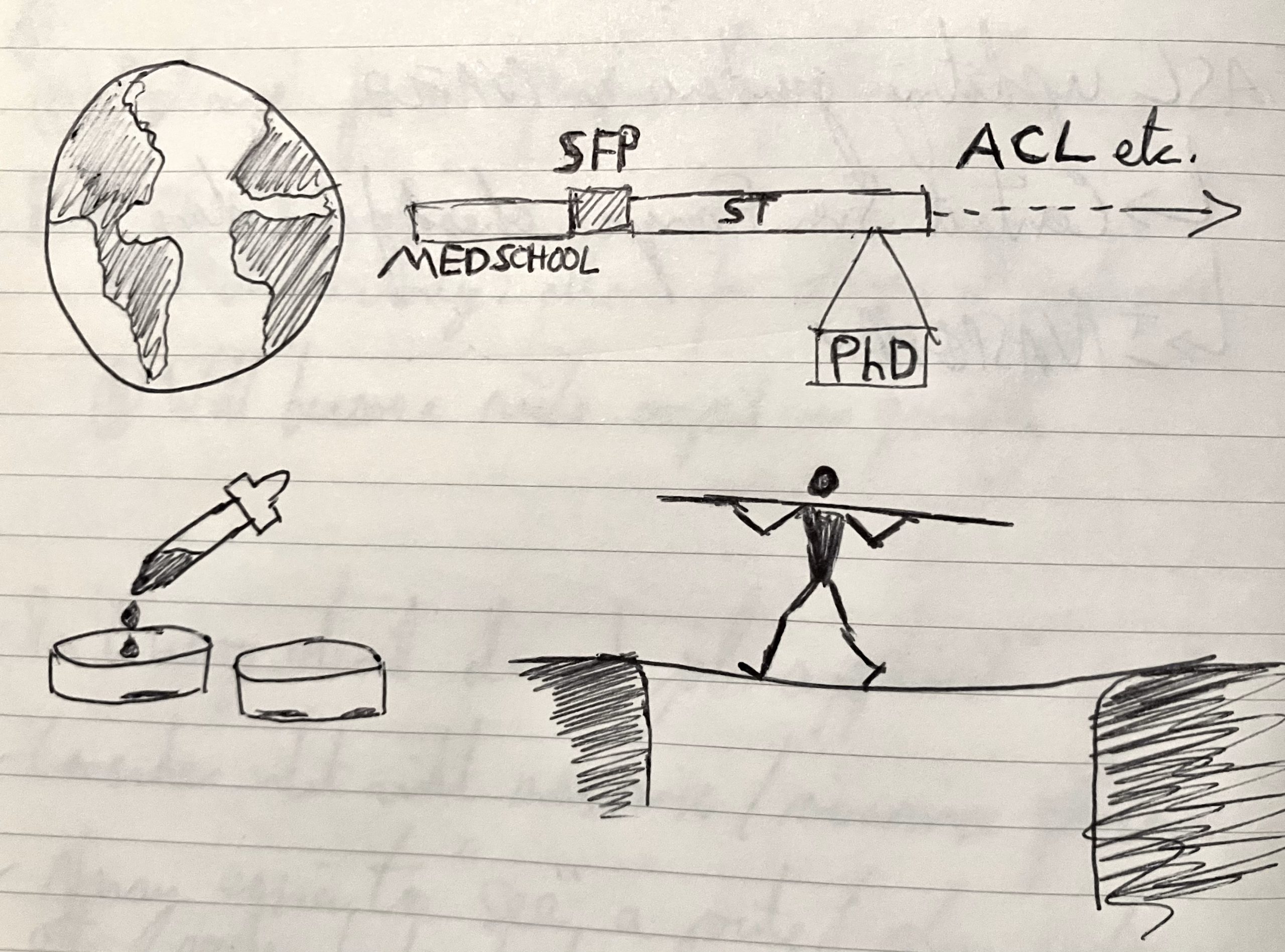Dispel myths, focus on one thing at a time, and diversify your identity.
Improving work-life balance involves dispelling false assumptions and doing more, not less. This may be at odds with many Trust-led well-being sessions. Achieving hamony would be easy if it were as simple as just doing less ‘unnecessary’ work, leaving on time, switching off email notifications, and practising mindfulness. You are already an efficient clinician with expertise in prioritisation. As with all worthwhile things, it’s a bit more complicated than that.
I would be lying if I said I had work-life balance all figured out. However, I have managed to juggle multiple things throughout training so far. I am often asked “How do you fit it all in?”
I suggest:
1. Let go of false assumptions about work-life balance
2. Intermittently neglect aspects of your life
3. Cultivate diversity in your identity
[I hate the term “work-life balance”. (a) Work constitutes the majority of our waking hours for most of our adult life. Work is part of life. (b) “Balance” conjures an image of scales that should be equally loaded until a point of equilibrium is reached. How many people do you know who have achieved ‘balance’? “Harmony” is a better term; work and life outside of work are intimately intertwined. This harmony is dynamic and shifts through days/months/decades. But, for ease of reading, I have continued to use “work-life balance” below.]
1. Let go of false assumptions
In order to move forward with reaching a state of contentment, first acknowledge that much of what is thought about work-life balance is not true.
- Less work means better work-life balance.
- There is an optimum balance point to maintain.
- It will be better when…
(a) Our relationship between work and how we experience life is complex. In general there is no linear relationship between volume of work and life satisfaction. This is particularly true for clinicians who do (comparatively) meaningful, challenging work. Reducing work hours may alone improve life satisfaction for a subset of people, but for most it is more complicated than that.

(b) The idea of finding balance is misleading. If you focus on short time intervals (e.g. a week) then it is rare to achieve an ideal steady state, let alone maintain it. Let go of the idea of reaching balance and embrace letting things swing one way then another in the short term (expanded below).

(c) The hedonistic treadmill is characterised by “once I’ve finished… / after this job… / if I can get onto… then I’ll feel happier/have more time etc.” This is the greatest lie we tell ourselves. Usually, that single thing we focus on does not bring about the change we seek. It is hard to predict future circumstances. Each change brings new problems, which we manage using our old habits. Life doesn’t tend to get less busy. So, do not wait for a future event to alter your work-balance.

2. Intermittently neglect aspects of your life
Do not attempt to achieve ‘balance’ on a day-to-day, or even week-to-week basis. Work and life fluctuates, particularly as a clinician. Work intensity increases during an on-call run or in the lead up to an exam. I suggest embracing this period. Don’t try to do everything at once. But it is critical to recognise when that phase ends and capitalising on it. That’s when you catch up with your friends, plan some mini-adventures with the family, and get the babysitter in to properly communicate with your other half.
The strategy is to ‘intermittently neglect’ various aspects of your life. If work is a priority for the next month, then your physical training may have to go on hold. You can always get away with putting one part of your life on the back-burner for a few weeks. Don’t let it go longer than that. (You can’t neglect your key relationships for too long.) Communicate honestly with the important people in your life “this next two months I’m totally focused on the FRCA and we might feel less close”.
This allows you to focus your energy guilt-free. It is vital that you identify times when the work intensity drops. Persistently neglecting health/family/friends/sleep leads to misery. So, plan your periods of increased work intensity.

Therefore, whilst life never feels balanced, over a few years, you will have kept harmony throughout all aspects of life.
3. Cultivate diversity in your identity
Who are you? Surgeon, mother, friend, swimmer, daughter etc. There are many ways to think of your ‘identities’ but I think that this Twitter-bio-style is a reasonable start. Life feels more balanced when you confidently engage in all those identities, i.e. get out there and do them.

It is common to reduce the diversity of non-work activities you do with age. Most people did more (different) activities/hobbies/socialising at 20 than they do at 40. I suggest that strengthening several non-work aspects of your identity will make life feel better. This may mean reigniting an old hobby, or making the effort to see friends who have moved away. It allows compartmentalisation; if work is rubbish for a while, then it is not all that defines you, so you can focus on positives elsewhere.
Important: this will come at the cost of something else. If you get into baking, learning French, scheduled ‘date night’ with your other half, or writing a blog, the energy (or time) must come from somewhere. It may mean sleeping less, or not doing a good work project, or letting the house be a bit more messy.
Also see:
Goal-setting for a meaningful year [Blog 009]
How to be productive [Blog 005]
Defining success. [Blog 003]
The war of art and Do the work by Steven Pressfield
The one thing by Gary Keller
The subtle art of not giving a f*ck by Mark Mason
The happiness project by Gretchen Rubin




One thought on “An alternative view on work-life balance [Blog 013]”
Comments are closed.